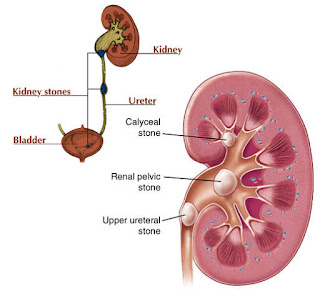owadays
the problem of Kidney stone has become common due to changing
lifestyle and other food habit disorders.
WhatAre Kidney Stones?
Kidney stone also known as renal calculi, are solid masses made of crystals. Usually Kidney stones originate in kidneys, but it can develop anywhere along your urinary tract which includes ureters, bladder, and urethra.
The causes of kidney stones vary according to the type of stone. Not all kidney stones are made up of the same crystals. The different types of kidney stones include:
Uric Acid: This
is more common in men than in women, it develops when urine is too
acidic.
Calcium stones: This is the most common type of Kidney Stone. They can be made of calcium oxalate (most common), phosphate, or maleate.
Calcium stones: This is the most common type of Kidney Stone. They can be made of calcium oxalate (most common), phosphate, or maleate.
Struvite: This type of stone is found mostly in women with urinary tract infections. These stones can be large and cause urinary obstruction.
Cystine: These type of stones are rare. It can occur in both men and women who have the genetic disorder cystinuria. With this type of stone, an acid called cystine occurs naturally in the body that leaks from the kidneys into the urine.
Risk Factors
The greatest risk
factor for kidney stones is making less than one liter of urine per
day. Other risk factors include:
- dehydration
- obesity
- high-protein, salt, or glucose diet
- hyperparathyroid condition
- gastric bypass surgery
- inflammatory bowel diseases that increase calcium absorption
- taking medications such as diuretics, anti-seizure drugs, and calcium-based antacids
Symptoms and Signs of a Kidney Stone
Symptoms of kidney stones may not occur until the stone begins to move down the ureters. The symptoms of kidney stones includes the following:
- fever
- chills
- frequent need to urinate
- urinating small amounts of urine
- blood in the urine (red, pink, or brown urine)
- vomiting
- nausea


